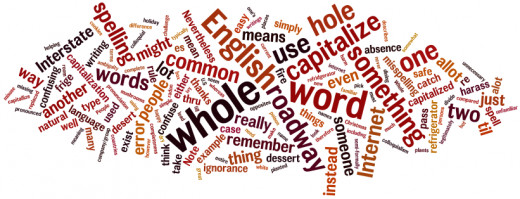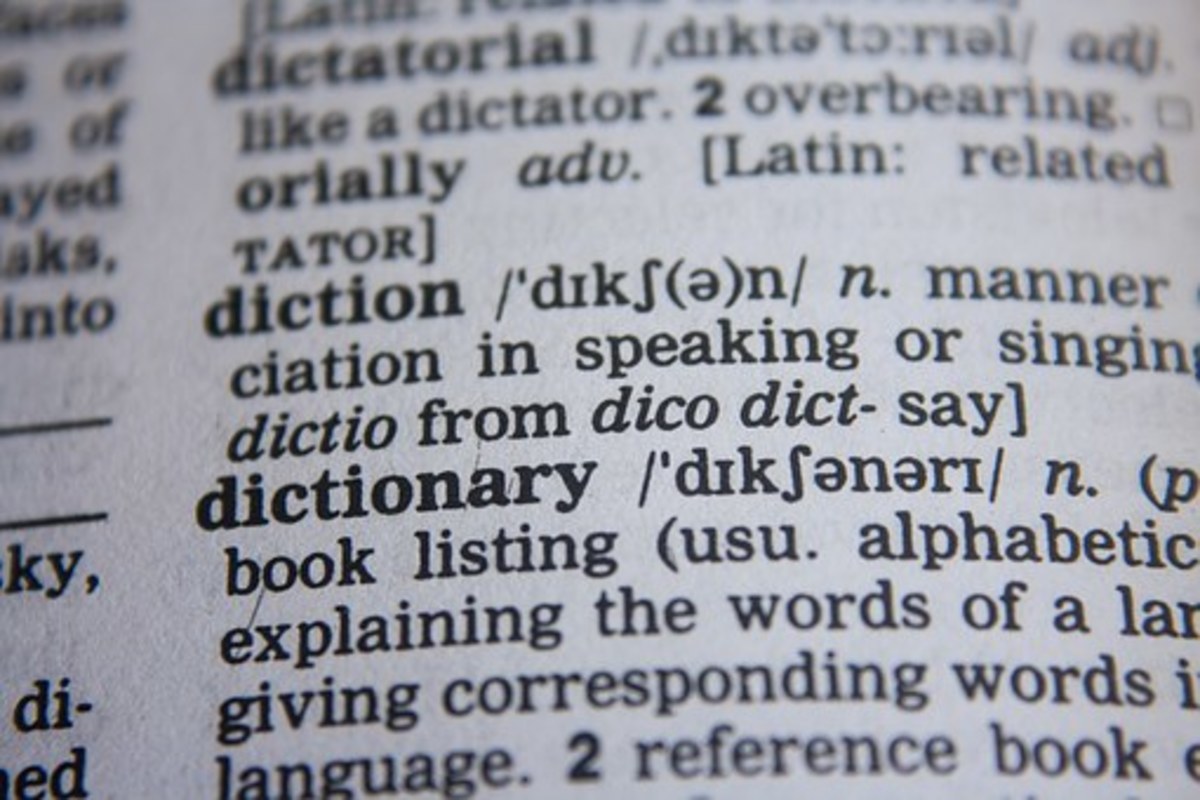Words That Are Most Misused in the English Language
A Cacophony of Errors

Commonly Misused Words in Formal Writing
Many words are commonly misused in the English language, either through ignorance, expediency, or misspelling. Here are a few of them. Note: This is in reference to FORMAL, professional communications, such as in business, not to tweets or other informal communications.
inflammable
This dangerous word should NEVER be used because it means BOTH "to catch fire" and "not to catch fire"! Use "flammable" and "nonflammable" instead to avoid the dangerous ambiguity!
"All natural" compared with "safe"
Plenty of "all natural" things can harm you and are not safe at all, for example: lead, radon, arsenic, poison ivy, cacti, some sharks, poisonous plants and mushrooms, certain snakes and bugs, lions, tigers, and bears: oh my!
thru or through
The word "thru" is simply a shortening of the word "through", and should not be used in formal writing. It will confuse people not familiar with colloquial English, such as people for whom English is not their first language or people from another English-speaking culture that doesn't use this unnecessary shortcut. If you use this often, set you AutoCorrect in Word to automatically correct it for you. Note that this advice applies to most of the words in this list.
alot and a lot and allot
In this case "alot" is simply always wrong. It is a misspelling of “a lot” (many) or allot (to distribute). People unfamiliar with English cannot look it up in a dictionary and have the meaning clarified, and adding a space between "a" and "lot" really doesn't take up much room in one's writings. You might as well educate yourself and your family now. Note that the word "allot" means to divide up and pass out something, such as food or money.
til or till instead of until or 'til
This is another case of laziness or ignorance. The word "til" does not exist. It is an English colloquialism (In other words, a localized common misuse of a word) for "until". Since they are both small words, you might as well just spell out "until" and make everyone happy. While you're at it, add the word "til" to the misspelling list in Microsoft Word so that it is flagged as a misspelling and add it (til-->until) to the AutoCorrect list. Make the software help you look good! That's what it's for!
Xmas instead of Christmas
This is a major holiday in some countries, including the U.S. Is it really necessary to abbreviate it this way? Should "Christ" really be replaced by an "X"? Although there is religious and popular precedent for allowing this abbreviation, as an editor I would still mark it incorrect because it is an abbreviation, just like I would mark any other unnecessary abbreviation as incorrect in formal writing.
hole and whole
This one is confusing to many. A "hole", for example, would exist in the ground where your new tree was about to be planted. It is an absence of something. That's an easy way to remember that "hole" is missing the "w" of "whole". "Whole" means complete and entire--"I ate the whole box of cookies." or "The whole jackpot went to Chris." In other words, these two are somewhat opposites of each other: a "hole" is an absence of something, where as a "whole" is a completeness of something. Remove the "w" if you mean "hole", use the "w" if you mean "whole."
refridgerator or refrigerator and fridge or frige
This is a simple spelling error. There is no "d" in refrigerator, and "frige" would typically be pronounced "frij" using typical English pronunciation. Just spell out the whole word when writing formally and say the whole word when speaking even semi-formally.
desert and dessert
This is a common spelling challenge for most of us because both words are valid English with different meanings. A desert (one “s”) is dry, and some are hot and sandy, whereas a dessert (two “s”es) is something that you might want a second helping of while dining. (“Seconds”=2 “s”es in "dessert" is an easy way to remember this difference in terms.)
Internet or internet
Why is “Internet” capitalized? I do not know either, because it is a thing and not the NAME of a thing, therefore it doesn’t pass the capitalization rule: capitalize the names of persons, places, and things. Nevertheless, the current editorial rule is to capitalize “Internet”. Note, however, that an "intranet", which is an internal company/group’s "Internet", is NOT capitalized. They’re just trying to confuse us, I think. I look forward to the day when Internet is no longer capitalized.
Interstate roadway or interstate roadway
Again, this is a capitalization thing. “Interstate” describes a type of automobile roadway, it is not the NAME of the roadway. Nevertheless, again we must capitalize it according to the standards: Interstate roadway. However, note that plenty of roads can run "inter-state", but that "inter-state roadway" is not capitalized.
harras or harass
This is a common spelling error. If you pick on someone mercilessly, you “harass” them (one “r”). In contrast, if you embarrass someone you need to use two “r”s, just to be confusing I think.
capitallize or capitalize
This is another common spelling error, one that I make too often. There should be only one “l” in “capitalize”, even though it might seem like you should use two. I remember this one by thinking, “capital-ize”. Again, set your Auto-correct in Microsoft(R) Word(R) to fix this automatically for you.
thx or thanks
If you're legitimately, honestly thankful, take a moment to type out the extra three characters in “thanks”, even if you’re texting someone. Emily Post would approve.
How Does Your Grammar Measure Up?
How many of these errors do you commonly make?
Do you think that language proficiency, spoken and written, influences the perception of that person's overall intelligence?

More From This Author
- How to Write Effective Computer Instructions
How to write easy-to-follow computer instructions that your readers can follow. Maybe even your mom! - How to Keep Costume Jewelry From Tarnishing
How to keep inexpensive jewelry from leaving green or black tarnish marks on your skin. Works for most costume jewelry, fashion jewelry, fake jewelry, wholesale fashion jewelry, and so on. - Get a Stuck Ring Off of Your Finger—No Cutting!
In order to remove a stuck ring, all you need is a helper and some dental floss (preferably waxed). Wind up the dental floss then unwind it pulling the ring along for the ride. Easy! No cutting required! - How to Clean a Bare, Unfinished Cedar Wood Deck With...
Clean a bare cedar deck the green way: with biodegradable liquid dish soap that is flora- and fauna-friendly—safe for kids and pets, too! Just soak, scrub with a deck brush, and rinse. Works great!
About the Author
Information about the author, a list of her complete works on HubPages, and a means of contacting her are available over on Laura Schneider's profile page.
© 2013 Laura Schneider








